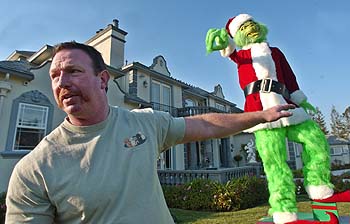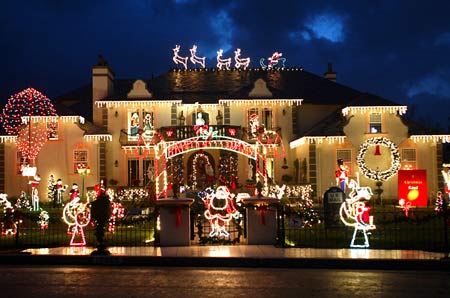Option 1
|
|
Gene
Sislit was recently fired from his position as a
biology teacher at Kennedy High in Tacoma, Washington. Sislit’s
sins, according to Char Lesdar of the Tacoma School
Board, were (1) raising dubious questions about the
theory of evolution in class (Sislet told students
that there were “too many missing links in the fossil
records for evolution to be true”), (2) suggesting to
his students that only a supernatural force could have
creating a specie as complex as man (Sislet said in
class that “the best evidence indicates that a divine
plan has been at work”), (3) criticizing students who
attempted to defend Darwin’s theory (Sislet told a
student who offered a theory as to how an eye might
evolve that “only a moron could believe that evolution
could create an eye”), and (4) writing a letter to the
editor of the Tacoma
Press ridiculing the theory of evolution and
promoting Scientific Creationism as an explanation for
the diversity of life. Lesdar said that the Board
concluded that Sislit’s actions brought ridicule to
the school system and threatened the ability of his
students to perform well on Biology AP tests and in
college. A.
Sislet argues that the Board’s
decision to fire him violates his First Amendment
rights and has sued the School District for
reinstatement and back pay. What
result? Following
Sislit’s firing, several parents of Christian
Fundamentalist students at Kennedy High asked the
principal to excuse their kids from any biology
classes in which the theory of evolution would be
taught. They
argued that the instruction in evolution undermined
their children’s belief in the literal truth of the
Bible, especially the story of creation told in
Genesis chapter 1.
When Principal Sue Secullow refused their
request, the parents brought an action in federal
district court arguing that under the Free Exercise
Clause students had a right to be excused from classes
in which the theory of evolution is taught. Moreover,
they argued, the students had a right not to have
their biology class grades affected by their refusal
to answer any exam questions relating to evolution. Your answers to these questions should total no more than 2,000 words. |
Option 3
In recent
years, hundreds of Muslims, many of them
recent immigrants from In the When the Eagle
Landing School Board met in November 2010, the
issue of Muslim students, and their lack of
assimilation, was a hot topic of debate. Phyllis
Schafney, a member of the Board, said, “These
Muslims are nothing but trouble and all should
be sent back to where they came from.” Schafney
proposed a new school regulation that would
prohibit students from wearing any sort of
headscarf in class or at any school-sponsored
event. The
ban would apply to head and neck scarves (such
as the hijab, favored by many Muslim women),
partial veils (niqabs) and full veils
(burqas).
Schafney said that such the headscarf
ban, if adopted, would send the message to
Muslims “that they are no longer welcome here
and should move somewhere else.” Morris
Sontag, another Board member, said that he
also favored the headscarf ban, but for a
different reason. “Headscarves
set the girls apart,” he said, “and are an
affront to their dignity.” If
we adopt this ban, he said, the girls would be
more accepted by their classmates and the
school will function as it should—“without all
these cliques and factions.” A
third member of the Board, Francis Hamm,
denounced the proposed rule. “This
is just blatant discrimination against a
religious minority!” she complained. Schafney
said the rule was just fine because it applies
to anyone—including boys who just want to wear
their winter scarves in class. When
debate ended, the Board voted 5 to 2 to
approve the ban on headscarves. Last month,
when the headscarf ban went into effect at
Eagle Landing High, seven Muslim girls were
told that they must remove their headscarves
or face suspension from school. The
girls refused, saying that their religion
required such modesty in public places. Principal
Helmsly said he understood their position, but
that “a rule is a rule” and suspended them
from school indefinitely. He
told them they could only return to school
once they have agreed not to wear headscarves. The suspension
of the “Headscarf Seven” prompted a number of
students at Eagle Landing High to stage a
protest in support of their Muslim classmates. Several
showed up wearing T-shirts that said, “End
Religious Bigotry.” The
T-shirt wearing students passed out flyers in
the hallways between classes that announced a
boycott, scheduled for the following Tuesday,
of classes to protest “religious bigotry in
Eagle Landing and to support religious freedom
for all students.” When
Principal Helmsly saw the flyers, he told them
that urging a boycott of classes was a
violation of school rules. As
punishment, Helmsly ordered the students to
prepare a large sign reading “ATTEND CLASSES
AND SUPPORT THE SCHOOL BOARD” and to hold the
sign up on the a sidewalk leading to the
school parking lot for three days from 3:00 to
4:00. If
they refused to do so, he said, they would be
suspended from school for a week. (A) Does the Eagle Landing School Board regulation that bans headscarves in schools violate the First Amendment? Discuss. (B) Did the
decision to order the protesting students to
prepare and hold a sign in punishment for
distributing their flyers violate the
students’ First Amendment rights? Discuss. Your answers to these questions should total no more than 2,000 words. |
Option 4
|
A group of Fundamentalist parents are upset with required readings in classes at a public school in Tennessee. Specifically, they believe that certain required readings promote secular humanism and undermine the religious beliefs of their children. They complain that Harry Potter books required in the seventh-grade favorably portray witchcraft. They complain that a senior-high physics book suggests that the Big Bang provides a credible explanation of the origin of the universe. Finally, they complain that biographies required in a tenth-grade history class promote feminism and the notion that women should find work outside the home. The Fundamentalist parents wonder whether the required
readings violate either the Establishment Clause or the
Free Exercise Clause. They would either like to
have a court order the curriculum be changed or that
their students be exempted from objectionable required
reading and instruction. What do you tell
them? Do they have a constitutional right to home
school their children if the curriculum is not changed? Your answers to these questions should total no more than 2,000 words. |
Option 5
|
Bogwon Bob is the charismatic leader of a religious cult called the "Eden's Garden Movement." Bogwon Bob announced that an isolated valley in southern California's Mojave Desert was "the new Garden of Eden," and urged his hundreds of followers to join him in settling in the small valley town of Jackolope. Within a year, nearly 700 Eden's Garden Movement members had moved to Jackolope, outnumbering the resident population of about 600. Last year, Eden's Garden Movement members captured the office of mayor in Jackolope, plus three of the five town council seats. Soon the council began adopting, always on 3 to 2 votes, a number of ordinances proposed and supported by Bogwon Bob. The first ordinance to be adopted by the Jackolope Town Council changed the official town seal and motto from one with a rattlesnake encircled by the words "Don't Tread On Me" to a silouette of a couple copulating encircled by the words "Make Love, Not Enemies". The seal was designed by Bogwon Bob and reflects his free love beliefs and practices, but the motto is not one with special religious significance for the Eden's Garden Movement. An eight-foot in diameter official seal was placed on the Town Hall, directly above the main public entry to the building. A second ordinance adopted by the Town Council declared the month of November to be "Freedom Month". The ordinance prohibited the wearing of any clothes during the month of November in Freedom Park, the newly renamed town square. Bogwon Bob has urged Eden's Garden Movement members to shed their clothes whenever temperatures allowed. Bogwon Bob believes that Genesis tells us that God intended that his children be naked and feel no shame. Eden's Garden worship services, where members sip communion wine and are offered--but emphatically reject-- apples, are conducted in the nude. Bogwon Bob teaches that clothes are an unfortunate manifestation of our self-pride and materialistic ways. Supporters of the Freedom Park measure also noted that nakedness breeds egalitarianism and feelings of fellowship and openness. Wearing clothes, according to another council member, "is just plain immoral". A third controversial decision of the Town Council was to appropriate $1000 for the purchase of books about Bogwon Bob and the Eden's Garden Movement. The books included an autobiography by Bogwon Bob, a collection of Bogwon Bob's favorite jokes, an Eden's Garden hymnal, and "The Yellow Book," a compilation of the sacred wisdom of Bogwon Bob. The purchased books were placed in the Town Library in the "Religion" section. (Books that were previously in the Religion section of the Library, including the Bible, the Koran, and books about other religions, were left on the shelves.) Needless to say, the 600 or so residents of Jackolope who are not members of the Eden's Garden Movement are up in arms over the new ordinances. On November 15, three Jackolope residents, finding the Freedom Park ordinance to be more than they could bear, marched, fully clothed, through the park carrying signs reading "Nudism is for Animals," "Go to Hell, Bogwon," and "Nudes are Nuts." They soon found themselves in shouting matches with Eden's Garden followers who objected to their signs and clothes. They were arrested for violating the town's ban on clothes wearing and for inciting a breach of the peace by carrying offensive signs. (A) Discuss the constitutionality of the town seal and motto and its placement on Town Hall. (B) Discuss the constitutional issues that might be raised by "The Jackolope Three" in an appeal of their convictions in municipal court for wearing clothes and inciting a breach of the peace. (C) Discuss the constitutional issues raised by the Town Council's appropriation of funds for new library books.Your answers to these questions should total no more than 2,000 words. |
Option 6
Snake-handling has long been a part of religious services in certain Pentecostal churches in Appalachia and the South. Unsurprisingly, the practice has resulted in a number of deaths of ministers and their snake-handling parishioners. The practice is inspired by a passage in the Book of Mark 15:16-17: "And these signs shall follow them that believe: In my name shall they cast out devils; they shall speak with new tongues. They shall take up serpents; and if they drink any deadly thing, it shall not hurt them; they shall lay hands on the sick, and they shall recover." Handling snakes is seen by some believers as a test of the strength of one's faith in God. In 1947, the Tennessee legislature made it illegal "for a person to display, handle, or use a poisonous or dangerous snake in such a manner as to endanger the life or health of any person." The act, which followed a rash of deaths in snake-handling churches, specifically excluded from its coverage any employee handling or using snakes in a "school or zoo." The sponsor of the 1947 law argued, "Tennessee has a right to guard against the unnecessary creation of widows and orphans. These churches are out of harmony with modern notions of morality." PLEASE DISCUSS WHETHER PASTOR HAMBLIN'S KEEPING OF SNAKES IN THE SNAKE ROOM OF HIS CHURCH, AND HIS HANDLING OF POISONOUS SNAKES DURING RELIGIOUS SERVICES, IS PROTECTED BY THE FREE EXERCISE CLAUSE. CAN THE 1947 TENNESSEE LAW CONSTITUTIONALLY BE APPLIED TO HAMBLIN? Your answers to this questions should total no more than 2,000 words. |



